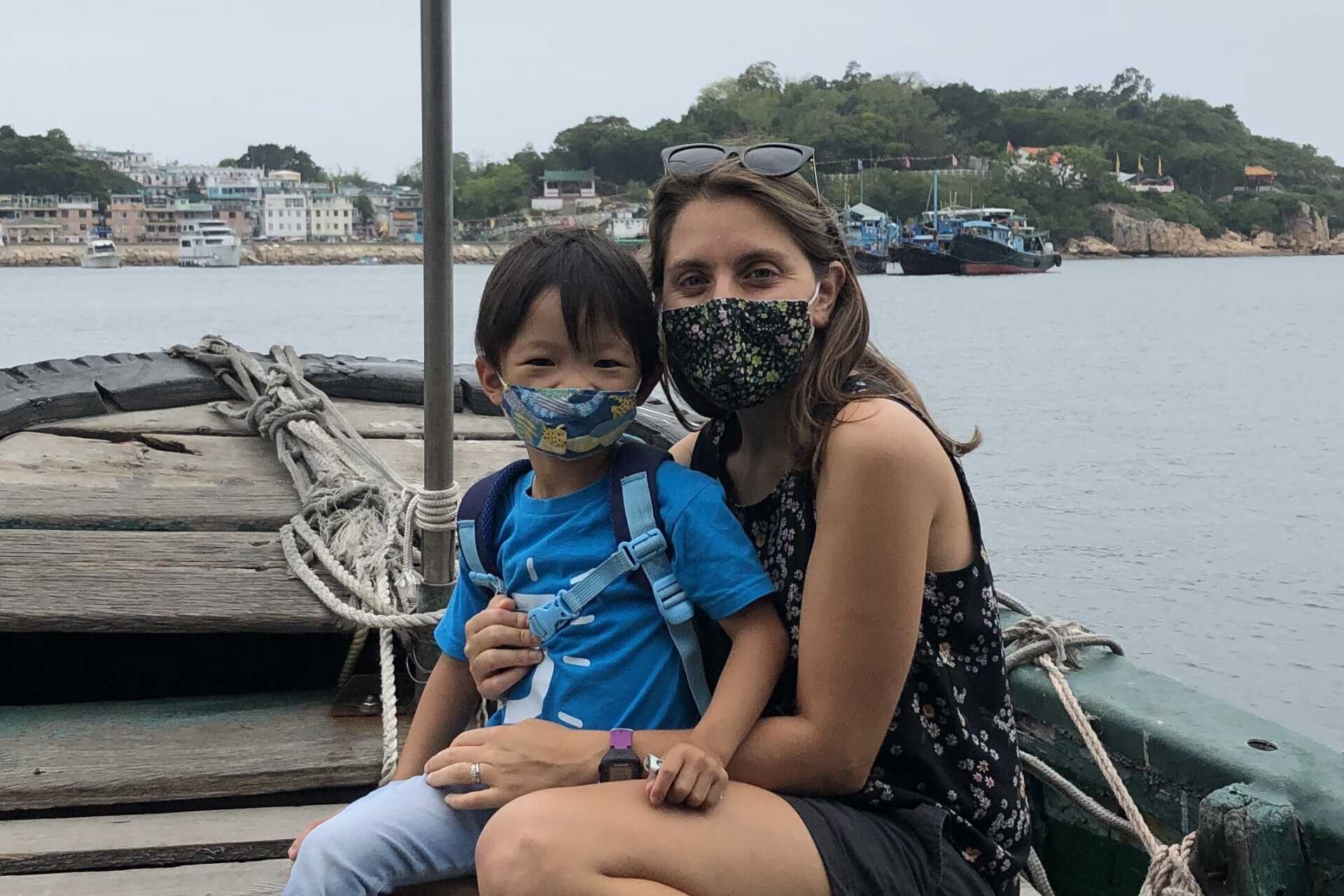Advanced Child Protection (Distance Learning)
Gain the knowledge, skills and confidence to take a child-centred approach to your practice and working life and take the next step in your career.

Gain the knowledge, skills and confidence to take a child-centred approach to your practice and working life and take the next step in your career.

The MA and other postgraduate courses in Advanced Child Protection - delivered by the Centre for Child Protection – are a fantastic opportunity to expand your knowledge through a 360 degree approach to child protection, giving you the skills and confidence to take the next step in your career and make a real difference. You’ll be joining an environment opportunity to access a diverse pool of knowledge in an environment that allows you to question and excel.
You’ll gain a 360-degree perspective on child protection, introducing you to the viewpoints of academics, practitioners, organisations, parents, children and young people, integrated with contemporary research theory and policy. You'll understand the impact that technology has on protecting children, and consider the effect of the globalisation of the abuse and exploitation of vulnerable children.
During your studies, you are encouraged to develop advanced communication skills, reflective analysis and the critical use of research. We also promote the confident use of direct work skills with adults and children.
It is possible to study certain individual modules from the MA on a Standalone basis. Each of our postgraduate standalone modules takes 10 weeks to complete and is equivalent to 20 credits at Master's level. They provide a taster and introduction to studying at the Centre for Child Protection, and if you wish to continue studying, you can use the credits from your taster modules to work towards a qualification in Advanced Child Protection (PCert, PDip or MA). However, please note that to join the postgraduate programme, you need to meet our entry requirements (detailed below). For further information about Standalone modules, including costs, see the Centre for Child Protection website.

You'll benefit from access to our award-winning training simulations and innovative learning tools and techniques.
In the Research Excellence Framework (REF) 2021, 100% of our Social work and social policy research was classified as ‘world-leading’ or ‘internationally excellent’ for impact and environment.
Following the REF 2021, Social work and social policy at Kent was ranked 3rd for research in the UK in the Times Higher Education.

Distance learning and part-time delivery means you can study alongside your career, getting both the experience and qualifications to take the next step.
The Centre for Child Protection maintains key partnerships with the NSPCC, the NHS, the Home Office and Kent Police (Special Branch).

You'll study child protection from all perspectives - academics, practitioners, organisations, parents, children and young people.
In the Research Excellence Framework (REF) 2021, 100% of our Social work and social policy research was classified as ‘world-leading’ or ‘internationally excellent’ for impact and environment.
Following the REF 2021, Social work and social policy at Kent was ranked 3rd for research in the UK in the Times Higher Education.
A minimum of a second class honours degree. In certain circumstances, the School will consider candidates who have not followed a conventional education path and these cases are assessed individually.
The course admissions team requires applicants to attend an online interview and complete a written task, in addition to the application form. Course offers are made on the condition that all stages are completed successfully.
All applicants are considered on an individual basis and additional qualifications, professional qualifications and relevant experience may also be taken into account when considering applications.
Please see our International Student website for entry requirements by country and other relevant information. Due to visa restrictions, students who require a student visa to study cannot study part-time unless undertaking a distance or blended-learning programme with no on-campus provision.
This course requires a Very Good level of English language, equivalent to a high B2 on CEFR.
Details on how to meet this requirement can be found on our English Language requirements webpage.
Examples:
IELTS 6.5 with a minimum of 5.5 in each component
PTE Academic 67 with a minimum of 59 in each sub-test
A degree from the UK
A degree from a Majority English Speaking Country
Please note that if you are required to meet an English language condition, we offer a number of pre-sessional courses in English for Academic Purposes through Kent International Pathways.
The following modules are offered to our current students. This listing is based on the current curriculum and may change year to year in response to new curriculum developments and innovation.
You must take all compulsory modules and select one of either Support, Help and Intervention in UK Child Protection or Support, Help and Intervention in International Child Protection.
You are up for an eye-opening journey through the historical and contemporary landscape of child abuse. You will unveil the everchanging discourses on child protection, from the 19th Century poverty-stricken society to the 21st Century where algorithms and social media loom large in children’s lives. Through this exploration, you will interrogate the definitions of child abuse and maltreatment, its prevalence, and incidence. You will critically examine why developing universally agreed standards for defining and addressing child maltreatment is problematic. In developing a historical consciousness, you will learn from the past to shape our current ways of thinking about child abuse and child protection. You will develop inclusive child protection practices in raising critical questions about the role of men in child protection. Drawing upon significant research findings, you will consider multiple perspectives, embracing insights from both the family and the child, thus harnessing an all-encompassing view of the child protection system.
The UK child protection policy landscape is an evolving entity and professionals can struggle to keep abreast of changes. Do you know what the law and policy guidance is expecting of you as a child protection professional? Do you have sufficient insight into the policies and practice challenges of your partner agencies? You will be provided with a critical backdrop to the legal frameworks governing UK child protection, both within a single and multi-agency context, and examine key barriers to inter-professional working. What is mandated for professionals is undoubtedly important but so too is exploring practice situations which present unpredictability and uncertainty. You will therefore also critically examine techniques and approaches to working with hostile and resistant families. How do you actually achieve effective communication? Models of best practice and theories will help you to develop good and sustained engagement with families and through engaging ‘Rosie 2’, the Centre’s award-winning, interactive and student-led simulation, you will have multiple opportunities to critically reflect on various scenarios. As neglect remains the prevalent category of abuse, ‘Rosie 2’ explores the impact, responses to and practice challenges in cases of child neglect.
Being ‘research minded’ is a crucial skill that is vital for every child protection practitioner. You will embark on a mission that equips you with the much-needed skills and knowledge to become a critical consumer of research. Through understanding how research is crafted and conducted to produce knowledge, you will develop a profound understanding of the multi-faceted landscape of social research. You will take a deep dive into philosophical perspectives that shape research methodologies, scrutinising the value of varied methods and ethical quandaries that confront researchers. From crafting a good research question to critically evaluating the implications of research findings, we will contemplate the strengths and limitations of quantitative, qualitative, and mixed methods approaches through the critical lenses of validity, reliability, generalisability, and transferability. When this mission is accomplished, you will have skills that can be deployed not just in your postgraduate studies, but in professional practice. As an ethically minded critical researcher, you will be able to draw from decolonial, anti-oppressive and inclusive approaches to producing knowledge.
Professional judgements are pivotal in safeguarding children. A skilled practitioner adeptly navigates varied assessment approaches, frameworks, and tools to make judgements that best protects a child from harm. Are you well versed in gathering information, but struggle to analyse its complexity? Embark on this voyage to reenvisage the child protection assessment process by learning from contemporary research and practice perspectives. Explore how attachment informed assessments can look at both the child and the caregiver, in terms of the latter’s capacity to mentalise: how parents do or do not engage in the psychological experiences of their children and how issues such as unresolved loss and trauma can impact parenting. Learn to use dynamic assessment tools and engage in award winning immersive serious digital games such as the myCourtroom: Rosie’s family go to court, developed by the Centre for Child Protection for valuable insights on risk, judgement, and decision-making thresholds in child protection contexts.
As a child protection professional you are immersed into the often complex and emotional world of not only the children, young people and families with whom you work, but also the working practices and culture of your employing organisation. Professional supervision provides a critical reflective space for processing your emotions but how genuinely does this support you to process your conscious and unconscious feelings and thoughts about a home visit, an organisational decision about a family or your own unexplained feelings about risks to a child or young person? This module includes a breadth of practical and theoretical learning, integrating research on neuroscience which evidences the impact of emotions on the brain. It is designed to centralise you in your workplace and provides a rare and invaluable experience of navigating the often-unspoken aspects of child protection organisations. Through critically reflecting on and discussing these dynamics, and exploring key concepts through the Centre’s child protection simulations, you will re-enter your workplace with a more holistic and healthier perspective on organisational life.
Unlock the potential of your passion for child protection with your dissertation! Take a deep dive into a child protection topic that ignites you and undertake a substantial piece of research integrating the knowledge and skills you have acquired across multiple modules on the MA programme. As a major piece of work, the dissertation is not just a requirement of your Master’s degree in child protection, but a catalyst for stimulating your critical thinking and the development of evidence-based arguments. With a dedicated supervisor by your side, walking the walk with you, complemented by taught sessions and dissertation drop-ins you are all set for a trip into the depths of knowledge and exploration.
Identifying and implementing interventions and services to address the needs of children and young people is familiar work for you as a child protection professional. But how extensive and current is your knowledge about what works and what doesn’t? You will critically reflect on interventions and services, examining their effectiveness in meeting the needs of diverse children, young people and families. Applying new and emerging theoretical lenses, you will learn the criticality of responding to the intersections of children’s lived experiences when planning services. This includes consideration of socio-economic factors, disability, sexuality, race and ethnicity, evaluating the values and ethics of child protection practice. Service provision in neoliberal economies can leave us feeling despondent but you will generate innovative and creative mechanisms to support those most at risk, engaging with interactive learning technologies which bring to life the lived experiences of vulnerable children and families.
At the heart of this transformative module lies a bold mission—to shape the practice of guardians who safeguard the most vulnerable. You are not mere learners; you will become architects of impact by diving deep into international child protection practice where you will unleash your analytical prowess and dissect diverse interventions used worldwide. You will engage in spirited discussions where your views and experiences matter. Infused with wisdom, empathy, and cultural intelligence, this module will enable you to unravel the intricate tapestry of global policies and understand their impact, their flaws, and their potential. You will evaluate the United Nations Convention on the Rights of the Child and its real-world impact, robustly and critically. You will step into the service user's shoes and consider what support truly matters to them and what ignites change while exploring ways to bridge gaps, unite minds and protect children's rights across the globe. Ultimately, you will lead in sculpting a safer, brighter world-one child at time.
A range of assessment methods ensure that theory and research relate to contemporary professional practice.
Teaching is based on guided study using an online learning environment (Moodle), videoed expert lectures, online seminars, 'serious games', acted and filmed role play, as well as web-based weekly forums.
During the programme you:
We also offer a variety of 10 week online distance learning standalone MA modules. The modules can be taken on their own or as a taster to Master's-level study. All the work is completed online where you participate in online forums and have access to journal articles and specialist materials. After successful completion of the assignment, the module is equivalent to 20 credits at Master’s level. For further information, see the Centre for Child Protection website.
For course aims and learning outcomes please see the course specification.
This course offers you the opportunity to study child protection through distance learning using innovative and cutting-edge techniques and technology. Teaching is delivered through the use of inter-professional serious training games, expert lectures, in the form of audio and videoed podcasts, acted role plays, presentations, online discussion forums and discussion forums. You access materials and online forums via Moodle, the University's Virtual Learning Environment and are assigned an academic adviser to support you through the duration of the course.
The team at the Centre for Child Protection is leading the way in developing new and innovative ways to deliver training and opportunities for simulated role play for professional development. The serious game concept offers a safe medium to explore and reflect upon child protection assessment. It offers professionals, at all stages of their careers, a unique way to evaluate real-life situations.
The first in the series of simulation training packages includes the 'Rosie Suite'. 'Rosie 1', looks at a challenging home visit to 4-year-old Rosie and her family. A subsequent simulation in our Rosie Suite, 'Rosie 2', promotes the theme of inter-professional practice by exploring the boundaries and challenges of a joint visit to the family by a health visitor and social worker some 5 years after 'Rosie 1'.
'myCourtroom: Rosie’s Family Go to Court' sees the family a further 3 years later whereby a disclosure during private family proceedings leads the family into public family proceedings – supporting learning of professional practice and knowledge of the family courts.
The Centre also has a 'Grooming Suite' of simulations. This includes both 'Zak at University' and 'Young Zak the Gamer' which focus on aspects of internet grooming into extremist thinking and action. We also have 'Looking out for Lottie' which is our award-winning simulation that looks at child sexual exploitation and 'Myrian and Joe: Behind Closed Doors' which is focused on radicalisation and extremist thinking. Our 'Grooming Suite' of simulations offer valuable learning packages to support both professionals and young people to support knowledge and aid in protection from different forms of grooming and exploitation. Finally, we also deliver a powerful training package for professionals, 'Crossing the Lines', which looks at criminal exploitation, gangs, and knife crime.
The Centre for Child Protection’s series of serious game simulations provide research-based case studies and the opportunities to explore the complex dynamics involved in making professional assessments and decisions in these contexts.
All students registered for a taught Master's programme are eligible to apply for a place on our Global Skills Award Programme. The programme is designed to broaden your understanding of global issues and current affairs as well as to develop personal skills which will enhance your employability.

Our Master’s and stand-alone modules give you the opportunity to further your career and expertise in child protection. As well as benefiting from Kent’s academic excellence, you gain insight into multi-agency relationships and responsibilities.
The Centre for Child Protection attracts students from across social work, health, education, police, law, probation and the third sector, and widens your potential learning experience.
The distance learning delivery of the Master’s programme enables you to fit learning around your life and work commitments and you have the chance to apply your knowledge as you progress. Each cohort contains a unique mix of experiences and professions, providing a valuable opportunity for information exchange and networking.
Our teaching is informed by leading research, meaning that you are not only taught through award-winning methods, but the content of what you are learning is at the very forefront of the field. Putting you in the driving seat for your career and future. Wherever you want to go in your career, Advanced Child Protection at Kent is a great first step to get you there.

The 2025/26 annual tuition fees for this course are:
The annual tuition fees for students starting this course in January 2025 can be found on the Student Finance page.
For details of when and how to pay fees and charges, please see our Student Finance Guide.
Tuition fees may be increased in the second and subsequent years of your course. Detailed information on possible future increases in tuition fees is contained in the Tuition Fees Increase Policy. If you are uncertain about your fee status please contact information@kent.ac.uk.
The University will assess your fee status as part of the application process. If you are uncertain about your fee status you may wish to seek advice from UKCISA before applying.
For details of when and how to pay fees and charges, please see our Student Finance Guide.
Tuition fees may be increased in the second and subsequent years of your course. Detailed information on possible future increases in tuition fees is contained in the Tuition Fees Increase Policy. If you are uncertain about your fee status please contact information@kent.ac.uk.
You'll need regular access to a desktop computer/laptop with an internet connection to use the University of Kent’s online resources and systems. We've listed some guidelines for the technology and software you'll need for your studies.
Find out more about accommodation and living costs, as well as general additional costs that you may pay when studying at Kent.
Search our scholarships finder for possible funding opportunities. You may find it helpful to look at both:

We have a range of subject-specific awards and scholarships for academic, sporting and musical achievement.

Supporting your success

Kent ranked top 40 in The Times Good University Guide 2025.
Fees and funding
Kent has risen 11 places in THE’s REF 2021 ranking, confirming us as a leading research university.

Student Support